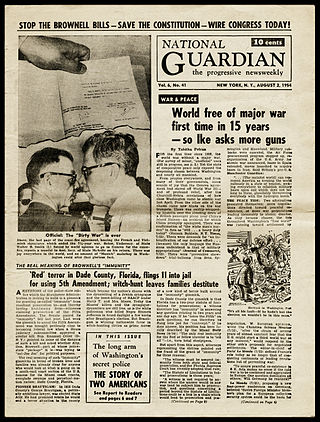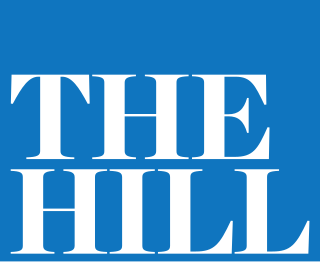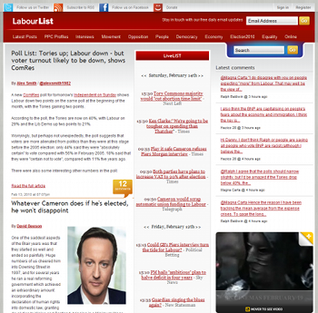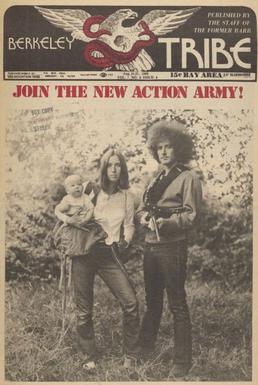
David Joel Horowitz is an American conservative writer. He is a founder and president of the right-wing David Horowitz Freedom Center (DHFC); editor of the Center's website FrontPage Magazine; and director of Discover the Networks, a website that tracks individuals and groups on the political left. Horowitz also founded the organization Students for Academic Freedom.

The Independent is a British online newspaper. It was established in 1986 as a national morning printed paper. Nicknamed the Indy, it began as a broadsheet and changed to tabloid format in 2003. The last printed edition was published on Saturday 26 March 2016, leaving only the online edition.

The Financial Times (FT) is a British daily business newspaper printed in broadsheet and published digitally that focuses on business and economic current affairs. Based in London, England, the paper is owned by a Japanese holding company, Nikkei, with core editorial offices across Britain, the United States and continental Europe. In July 2015, Pearson sold the publication to Nikkei for £844 million after owning it since 1957. In 2019, it reported one million paying subscriptions, three-quarters of which were digital subscriptions. The newspaper has a prominent focus on financial journalism and economic analysis rather than generalist reporting, drawing both criticism and acclaim. It sponsors an annual book award and publishes a "Person of the Year" feature.
Triple oppression, also called double jeopardy, Jane Crow, or triple exploitation, is a theory developed by black socialists in the United States, such as Claudia Jones. The theory states that a connection exists between various types of oppression, specifically classism, racism, and sexism. It hypothesizes that all three types of oppression need to be overcome at once.

The Baltimore Sun is the largest general-circulation daily newspaper based in the U.S. state of Maryland and provides coverage of local and regional news, events, issues, people, and industries.
The Weekly Worker is a newspaper published by the Communist Party of Great Britain (CPGB-PCC). The paper is known on the left for its polemical articles, and for its close attention to Marxist theory and the politics of other Marxist groups. It claims a weekly online readership averaging over 20,000, Weekly Worker simultaneously also distributes 500 physical copies a week.
The South End is the official student newspaper of Wayne State University in Detroit, Michigan, published in print and online. It was founded in 1967, and its publication is funded partly from university funds and partly from advertising revenues. It is distributed free of charge.

The National Guardian, later known as The Guardian, was a left-wing independent weekly newspaper established in 1948 in New York City. The paper was founded by James Aronson, Cedric Belfrage and John T. McManus in connection with the 1948 Presidential campaign of Henry A. Wallace under the Progressive Party banner. Although independent and often critical of all political parties, the National Guardian is thought to have been initially close to the ideological orbit of the pro-Moscow Communist Party USA, but this suspected association quickly broke down in the course of several years.

The Hill is an American newspaper and digital media company based in Washington, D.C., that was founded in 1994.
Black feminism, also known as Afro-feminism chiefly outside the United States, is a branch of feminism that centers around black women.

Spiked is a British Internet magazine focusing on politics, culture and society. The magazine was founded in 2001 with the same editor and many of the same contributors as Living Marxism, which had closed in 2000 after losing a case for libel brought by ITN.
Gay Community News was an American weekly newspaper published in Boston, Massachusetts from 1973 to 1999. Designed as a resource for the LGBT community, the newspaper reported a wide variety of gay and lesbian-related news.

The Chicago Seed was an underground newspaper published biweekly in Chicago, Illinois from May 1967 to 1974; there were 121 issues published in all. It was notable for its colorful psychedelic graphics and its eclectic, non-doctrinaire radical politics. Important events covered by Seed writers and artists were the trial of the Chicago Eight, Woodstock, and the murder of Fred Hampton. At its peak, the Seed circulated between 30,000 and 40,000 copies, with national distribution.

LabourList is a British news website supportive of, but independent of, the Labour Party, launched in 2009. Describing itself as Labour's "biggest independent grassroots e-network", the site's content includes news, commentary, interviews, campaign information, analysis and opinion from various contributors and sources across the Labour and trade union movement. It is funded by trade unions, adverts, and individual donors. LabourList started as a weblog with reader comments, but in February 2019 the ability for readers to write comments was removed.

The Berkeley Tribe was a radical counterculture weekly underground newspaper published in Berkeley, California from 1969 to 1972. It was formed after a bitter staff dispute with publisher Max Scherr and split the nationally known Berkeley Barb into new competing underground weeklies. In July 1969 some 40 editorial and production staff with the Barb went on strike for three weeks, then started publishing the Berkeley Tribe as a rival paper, after first printing an interim issue called Barb on Strike to discuss the strike issues with the readership. They incorporated as Red Mountain Tribe, named after Gallo's one gallon finger-ringed jug of cheap wine, Red Mountain. It became a leading publication of the New Left.

The Express Tribune is a daily English-language newspaper based in Pakistan. It is the flagship publication of the Daily Express media group. It is Pakistan's only internationally affiliated newspaper in a partnership with the International New York Times, the global edition of The New York Times. Headquartered in Karachi, it also prints copy from offices in Lahore, Islamabad, and Peshawar.

The Third World Women's Alliance (TWWA) was a revolutionary socialist organization for women of color active in the United States from 1968 to 1980. It aimed at ending capitalism, racism, imperialism, and sexism and was one of the earliest groups advocating for an intersectional approach to women's oppression. Members of the TWWA argued that women of color faced a "triple jeopardy" of race, gender, and class oppression. The TWWA worked to address these intersectional issues, internationally and domestically, specifically focusing much of their efforts in Cuba. Though the organization's roots lay in the black civil rights movement, it soon broadened its focus to include women of color in the US and developing nations.
The Week was a socialist magazine founded by Ken Coates and Pat Jordan in January 1964. The magazine was edited by Jordan as the journal of the International Group and aimed at a readership in the left wing of the Labour Party. Coates and Jordan were Marxist members of the Labour Party connected to the New Left Review, to which Marxist journalist Claud Cockburn occasionally contributed. Their version of The Week, named after the earlier The Week that had been edited by Cockburn, provided a socialist critique of Harold Wilson's government, notably over its failure to oppose the Vietnam War. Jordan edited the paper until 1968, when he cooperated with Tariq Ali in launching The Black Dwarf. At that time The Week became a monthly magazine called International, which was published by the International Marxist Group.
Chardine Taylor-Stone is a British feminist activist, writer and musician. In December 2015 Taylor-Stone founded Stop Rainbow Racism to campaign against the performance of ‘Black face’ at LGBTQ+ Venues. The campaign began in response to a performance by Drag queen Charlie Hides at The Royal Vauxhall Tavern. Taylor-Stone is the drummer for Big Joanie since the band was founded in 2013.











